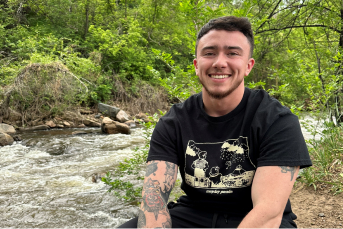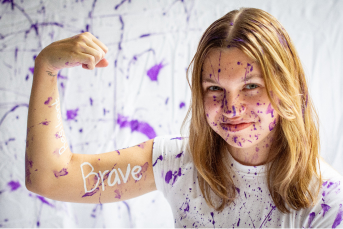
Meet Marion Clignet, a former cycling World Champion and 2 time Olympic silver medalist who was diagnosed with idiopathic generalized epilepsy at 22 years old. After her diagnosis she saw her hopes of representing the USA dashed, as the US Cycling Federation deemed her condition ‘too much of a risk’. Read the full story below:
Tell us about what you’re doing now?
I currently live right outside Toulouse. We created the French Association of Female Cyclists in June with a combination of retired and active riders. I've gone to a few of the top races to create a familiarity with the girls. At the moment we have lots of Zoom conferences to see how the girls were coping during the lock down.
The only issue is that it’s a voluntary role and I'm unable to survive on this alone. I'm doing a little bit of consulting work as a coach but I would love to do work with this association as a full time job as I have a real passion for it. I’d love to see these next generations be able to compete and above all be considered and respected as professional athletes without having to work another job. Women’s cycling is getting more popular and we’re trying to negotiate with our federation so that riders who have professional contracts as cyclists may also have professional racing licenses.
How did you start cycling?
I had my first seizure when I was 22, the neurologist told me I would have to take medication for the rest of my life. I couldn’t drive, and I was advised that I shouldn't talk to anyone about it because it was taboo.
The first thing I did was ride 60km on my bike to get to work and back. I enjoyed the effort and the fact I didn't have to rely on public transport to get there. Someone at work asked if I would be interested in trying a bike race. He convinced me and I ended up doing the race. I didn’t win but came fourth, I asked the winner what I needed to do to improve and she said ‘get rid of everything’ - she was right, I needed proper cycling equipment.
Then 4 years down the line I won the US National Championships, I wasn't allowed to compete for the USA in the World Championships because the US Cycling federation said that having epilepsy made me a risk to the team. But some French cyclists told me to come over to France, I went in August and did the season there. I was really upset by not being accepted for the US team but having something else to focus on really motivated me.
Do you have any personal career highlights?
One of my biggest was in 1991. I trained the hardest I've ever trained, with the French women’s team selected for the world championship team time trial. We'd competed against each other before but now we had to work together to win and we did. When I stepped down from the podium, the US coach came over to shake my hand and congratulated me, he said he took credit for the win- "if i put you on the US team it would've been easy, this made you hungrier". I didn't have anything particularly against him, epilepsy really is responsible for my success because it always made me push myself harder. I don't think I would have made it to where I am now if it wasn't for having epilepsy as it always made me push myself harder.

Tell us about your Olympics and World Championships experience?
My first World Championships were quite stressful. After that I worked on managing stress. I knew I was the favorite and believed I was going to win as I had done all the work. I was warming up on the track before the pursuit, all of a sudden I heard my front tire hiss on the track. I felt a hand on my shoulder and a huge sprinter guided me to the track center to avoid a pile up!. I changed my wheel and got back on to the back of the group to finish my warm up. I went on to put on the fastest time in the heats.
The Olympics were a different animal, I never found that same kind of ease. I knew I was racing for 2nd. It was difficult. The French Federation wouldn’t let us use the Graeme Obree position (superman) in Atlanta. My main competitor in Atlanta, Antonella Bellutti, was using it and I let that get in my head - she beat me. I managed to avenge myself and win the World Championships while breaking the world record a few weeks later while using the superman position. 80% of sport is mental.
What was your experience with the United States Cycling Federation?
I won 3 medals at the National Championships, which was a big part of the selection process. I won the team time trial with my group and took 3rd in the individual time trial. I had everything I needed to represent the USA. But the coach was worried about epilepsy, on one occasion I had a seizure at the airport, he didn't know I had epilepsy but luckily the team physio had seen a seizure before so he was able to help. Later on he saw I bounced back, then throughout that season I felt I had to do more to prove myself, it really did make me work harder.
I think it was his own concerns, he didn't want to be responsible as he thought the stress from the World Championships would be a high-danger for me. I was so angry at the time, I had quite the temper. Had I completely released my anger I probably would've headbutted him on the spot. Then 2 days later the French girls asked me to join them in France so I finished my season in Brittany and got in some excellent racing.
Are there difficulties women face in the cycling world?
Almost every cycling coach is male, they don't all understand that women’s menstrual cycles can be somewhat of an ergogenic aid - you train differently and you have different access to nutrients during your hormonal changes. Cycling is starting to change, but we need more women in higher positions. I was the first woman to coach a Tour de France men’s team, I was a little surprised that not many, if any, of them did any strength work at the time so I set about to change that.
Find out about how women’s hormonal changes can affect your epilepsy here.
Can you share with us your epilepsy story?
My epilepsy is generalized idiopathic, they have no idea why it came on. There are no dramatic signs in my EEG's. They did all the measurements for 3 days, but they had no idea where it started, what causes it & why. Which is highly frustrating. I only experience tonic clonic seizures, when I have one I have no idea what happened - it takes me 10-15 minutes to get back on track.
I'm lucky because I can feel when a seizure is coming, I get an aura which helps me to put myself in a safe place. The symptom is fairly discrete and happens in the morning. It’s a little like losing your train of thought but a bit more subtle. In any case, I usually have a 2-4 hour time span before the seizure happens
Have attitudes towards epilepsy changed in the sporting world?
People don't know what to do. Every year we organize a bike ride to raise money to build a gym for kids with epilepsy. For the first time in 12 years that we’ve organised I had 2 seizures during the reception. 2 people I know very well were really freaked out by what they witnessed. Because my epilepsy is not a visible condition, it really shocked them to see me have a seizure. The next day I got all these messages, like someone had died. I responded saying the upside of this is seeing why what we are doing is important and why we do this. It’s not always easy to see the positive side, sometimes I have to wrestle with myself because if you fall into the negative spiral there is no end to it.
Your message to anyone else with epilepsy?
"Screw you, watch me!”. Where there is a will, there's a way. I understand it's harder for different people, for me personally I’ve become an endorphin addict so I need that adrenaline from exercise but that isn’t possible for many. So keep at it, stay positive and keep your will - whilst you have a will, you have a way.

















